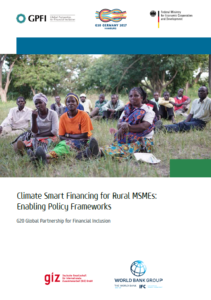
Climate change increases risks and presents significant challenges as well as potential opportunities for rural Micro, Small and Medium Enterprises (MSMEs.) However, financing is crucial for enabling these MSMEs to adopt needed practices and investments in technologies and approaches that are climate smart. This is particularly challenging for those MSMEs in the rural and agricultural setting which are most vulnerable and already have the most difficulties accessing finance.
Source: Global Parntership for Financial Inclusion (GPFI)
This policy document was produced on behalf of the G20 Global Partnership for Financial Inclusion (GPFI) in 2017 and presented at the G20 GPFI Forum and endorsed by the G20 GPFI at the Plenary in May 2017 in Berlin.
The document presents a synthesis of the key lessons and implications of climate change needs and solutions for MSMEs in developing countries with an emphasis on the
implications for governments and development agencies to consider. The document is enriched with many case examples of practices implemented around the world. Based on this analysis, evidence from the case studies and the modeling of climate smart MSMEs, the document elaborates policy options for G20 policy makers. These options are designed to help overcome market failures that prevent rural MSMEs’ adaptation to climate change and help enable and incentivize MSMEs to access climate smart financing. These adaptations would not only reduce MSME vulnerability but also help reduce CO2 emissions and pollution.
The paper first addresses the issues surrounding rural and agricultural MSMEs and constraints they face for finance and investment; it then assesses the gaps for climate smart MSMEs. The subsequent section describes climate smart adaptation and mitigation solutions for MSMEs. It does this by highlighting some of the current understanding of the climate financing problem as well as relevant lessons learnt from the sustainable energy financing area, followed by potential ways forward, with policy implications relating to adaptation. It then presents opportunities that can be realized from new climate smart technologies and efficiencies that can be gleaned from “green” finance and investment.
The document moves from outlining the needs, constraints and opportunities to focusing on the climate smart financial solutions for MSMEs. These financial solutions include financial tools and public-private collaboration for scaleup of climate smart investment with an emphasis on the policy implications. Policy is noted as an important driver of change and a policy assessment and options are presented with regards to how policy makers can promote financing MSME climate smart adaptation. The policy options are summarized into a Policy Toolbox with applications and examples to facilitate policy discussion.
Key policy messages highlight that climate smart adaptation and risk mitigation policies need to empower and provide an enabling environment for change, provide incentivizes to build capacity and facilitate financing and investment. Blended finance, partial guarantee schemes and insurance support may be required to promote and incentivize financial institutions to lend and for rural MSMEs to be able to borrow. Private financial institutions must play an important role in climate smart financing and public financing schemes can help “crowd in” their participation.
Read More
Policy Brief: Climate Smart Financing for Rural MSMEs: Enabling Policy Frameworks
